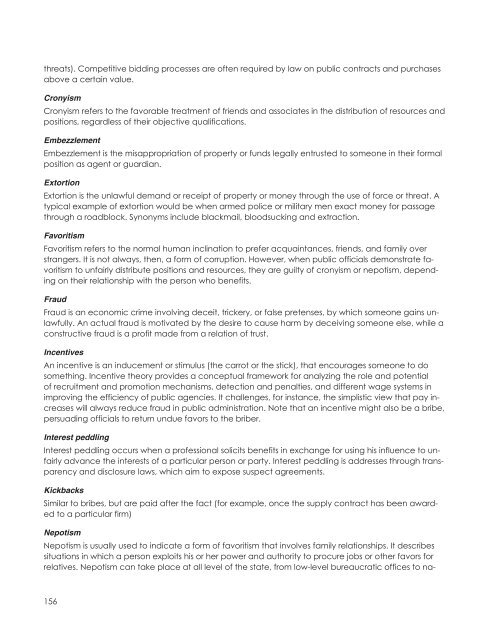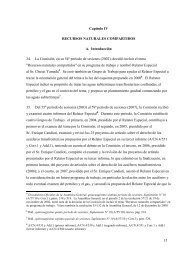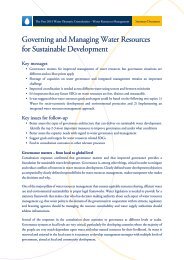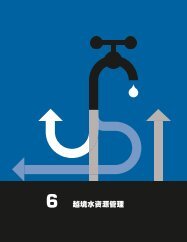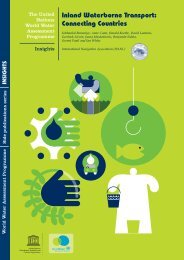A Sourcebook - UN-Water
A Sourcebook - UN-Water
A Sourcebook - UN-Water
Create successful ePaper yourself
Turn your PDF publications into a flip-book with our unique Google optimized e-Paper software.
threats). Competitive bidding processes are often required by law on public contracts and purchases<br />
above a certain value.<br />
Cronyism<br />
Cronyism refers to the favorable treatment of friends and associates in the distribution of resources and<br />
positions, regardless of their objective qualifications.<br />
Embezzlement<br />
Embezzlement is the misappropriation of property or funds legally entrusted to someone in their formal<br />
position as agent or guardian.<br />
Extortion<br />
Extortion is the unlawful demand or receipt of property or money through the use of force or threat. A<br />
typical example of extortion would be when armed police or military men exact money for passage<br />
through a roadblock. Synonyms include blackmail, bloodsucking and extraction.<br />
Favoritism<br />
Favoritism refers to the normal human inclination to prefer acquaintances, friends, and family over<br />
strangers. It is not always, then, a form of corruption. However, when public officials demonstrate favoritism<br />
to unfairly distribute positions and resources, they are guilty of cronyism or nepotism, depending<br />
on their relationship with the person who benefits.<br />
Fraud<br />
Fraud is an economic crime involving deceit, trickery, or false pretenses, by which someone gains unlawfully.<br />
An actual fraud is motivated by the desire to cause harm by deceiving someone else, while a<br />
constructive fraud is a profit made from a relation of trust.<br />
Incentives<br />
An incentive is an inducement or stimulus (the carrot or the stick), that encourages someone to do<br />
something. Incentive theory provides a conceptual framework for analyzing the role and potential<br />
of recruitment and promotion mechanisms, detection and penalties, and different wage systems in<br />
improving the efficiency of public agencies. It challenges, for instance, the simplistic view that pay increases<br />
will always reduce fraud in public administration. Note that an incentive might also be a bribe,<br />
persuading officials to return undue favors to the briber.<br />
Interest peddling<br />
Interest peddling occurs when a professional solicits benefits in exchange for using his influence to unfairly<br />
advance the interests of a particular person or party. Interest peddling is addresses through transparency<br />
and disclosure laws, which aim to expose suspect agreements.<br />
Kickbacks<br />
Similar to bribes, but are paid after the fact (for example, once the supply contract has been awarded<br />
to a particular firm)<br />
Nepotism<br />
Nepotism is usually used to indicate a form of favoritism that involves family relationships. It describes<br />
situations in which a person exploits his or her power and authority to procure jobs or other favors for<br />
relatives. Nepotism can take place at all level of the state, from low-level bureaucratic offices to na-<br />
156


